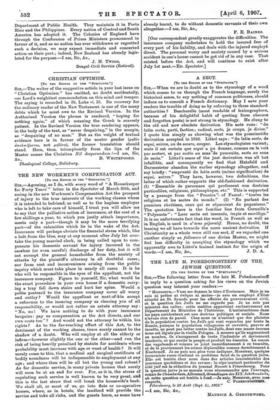THE NEW WORKMEN'S COMPENSATION ACT. [To Tee EDITOR or TEE
SPECTATOR"] Sia,—Agreeing, as I do, with every word of "A Housekeeper for Forty Years " letter in the Spectator of March 30th, and seeing in the new Workmen's Compensation Act the prospect of injury to the true interests of the working classes whom it is intended to befriend, as well as to the hapless employer who is left to take care of himself, I trust you will allow me to say that the palliative action of insurance, at the cost of a few shillings a year, to which you justly attach importance, meets only a part—though it may be the more terrifying part—of the calamities which lie in the wake of the Act. Insurance will perhaps obviate the financial stress which, like a bolt from the blue, may at any moment after July 1st over- take the young married clerk, in being called upon to com- pensate his domestic servant for injury incurred in the careless (or even careful) discharge of her duty, but it will not exempt the general householder from the anxiety of attacks by the plaintiff's attorney in all doubtful cases ; nor from cost and inconvenience arising from the public inquiry which must take place in nearly all cases. It is be who will be responsible in the eyes of the appellant, not the insurance company. Figure to yourself, Sir, what would be the exact procedure in your own house if a domestic carry- ing a tray fell down stairs and hurt her spine. Would a polite postcard to the insurance company cover all worry and outlay ? Would the appellant or next-of-kin accept a reference to the insuring company as clearing you of all responsibility, or would not rather an astute attorney say: "No, no ! We have nothing to do with your insurance bargains pay us compensation as the Act directs, and oar own costs too " ? And would not the attorney be within his rights ? As to the far-reaching effect of this Act, to the detriment of the working classes, there surely cannot be the shadow of a doubt. Who will employ at all the elderly or infirm—however slightly the one or the other—and run the risk of being heavily penalised by statute for accidents whose probability must increase with age or want of health It will surely come to this, that a medical and surgical certificate of bodily soundness will be indispensable to employment at any age; and where then will be all but the young and robust ? As for domestic service, in many private houses that surely will soon be at an end for ever. For, as it is, the stress of regulating such service is well known to be very great, and this is the last straw that will break the housewife's back. We shall all, or most of us, go into flats or co-operative houses, where, as in hotels, the landlord will provide the service and take all risks, and the guests learn, as some have
already learnt, to do without domestic servants of their own altogether.—I am, Sir, te.c.,
F. E. BAINES.
[Our correspondent greatly exaggerates the difficulties. The insurance company undertakes to hold the insured free of every part of his liability, and deals with the injured employe direct. The personal worry and anxiety caused by a serious accident in one's house cannot be got rid of in any case. That existed before the Act, and will continue to exist after July 1st next.—En. Spectator.]










































 Previous page
Previous page